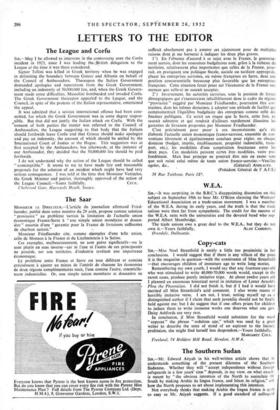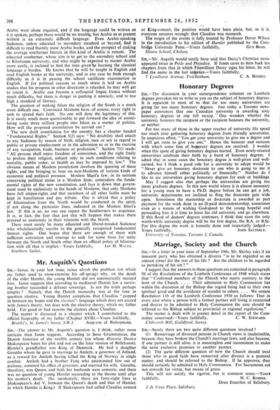The Southern Sudan
Sup,—Mr. Edward Atiyah in his well-written article shows that he understands something of the present dilemma of the—Southern Sudanese.. Whether they will " accept independence without foreign safeguards in a few years' time" depends, in my view, on what exactly is meant by " the obvious intention of the North to assimilate the South by linking Arabic its lingua franca, and Islam its religion," and bow the North proposes to set about implementing this intention. Not everybody thinks that making Arabic the lingua franca is quite so easy as Mr. Atiyah suggests. If a good standard of colloquial Arabic were alone required, and if the language could be written as it is spoken, perhaps there would be no troubls, but Arabic as at present written is an extremely difficult language. Even Arabic-speaking Sudanese, unless educated to secondary standard or beyond, find it difficult to read fluently most Arabic books, and the prospect of making the average southerner literate in this kind of Arabic is remote. The educated southerner, whose aim is to get to the secondary school and to Khartoum university, and who might be expected to master Arabic more easily, is inclined to find the time givettlo learning the classical language a burden. He knows that he will be taught in English and read English books at the university, and in any case he- finds enough difficulty as it is in passing the school certificate examination in English. If for political reasons so much stress is laid on Arabic studies that his progress in other directions is retarded, he may well get to resent it. Arabic can become a colloquial lingua franca without much difficulty, but there is danger in pushing it unwisely, and to too high a standard of literacy.
The question of making Islam the religion of the South is a much more difficult one. Convinced Moslems have, of course, every right to seek to spread their faith. No one will deny the legitimacy of this. It is surely much more questionable to put forward the idea of assimi- lating some three million people into Islam as a matter of politics. How will the proposed assimilation be carried out ?
The new draft constitution for the country has a chapter headed " Fundamental Rights." Section 5(2) says: " No disability shall attach to any Sudanese by reason of birth, religion, race or sex in regard to public or private employment or in the admission to or in the exercise of any occupation, trade, business or profession." Section 7(1) reads: " All persons shall enjoy freedom of conscience, and the right freely to profess their religion, subject only to such conditions relating to morality, public order, or health as may be imposed by law." The obvious means of Moslem proselytism involves the ignoring of these rights, and the bringing to bear on non-Moslems of various kinds of economic and political pressure. Moslem Shari'a law, in its sections concerning political status in a Moslem State, contradicts the funda- mental rights of the new constitution, and lays it down that govern- ment must be exclusively in the hands of Moslems, that only Moslems have full citizen-rights and that members of all other faiths must be kept in humiliation and pay tribute. One is afraid that a policy of Islamisation from the North would be conducted in the spirit, if not along the particular lines, indicated in the Moslem Shari'a law. If this is so, no one can expect the Southerners to acquiesce. It is, in fact, the fear that just this will happen that makes them proceed so cautiously in their relations with the North.
There must surely be many educated and liberal-minded Sudanese who wholeheartedly ascribe to the generally recognised fundamental human rights. One hopes that there are enough of them with sufficient conviction and courage to seek for some basis for unity between the North and South other than an official policy of Islamisa- tion with all that it implies.—Yours faithfully, Lot H. WATTS. Southern Sudan.



































 Previous page
Previous page